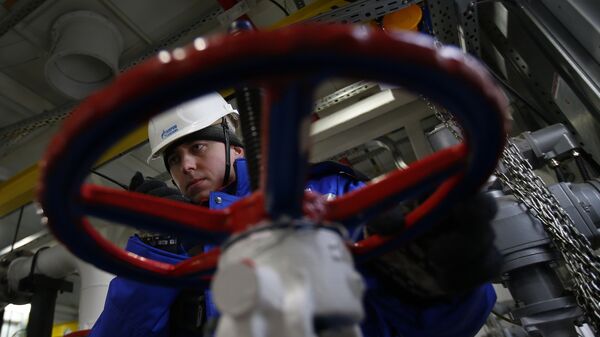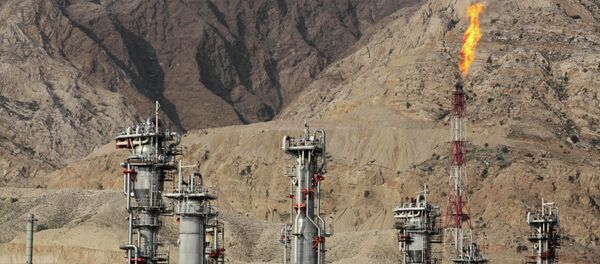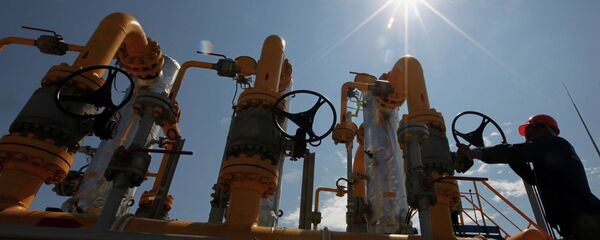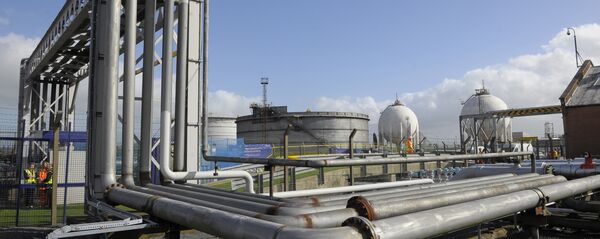The latest round of US sanctions against Russia increases uncertainty on European gas markets, S&P Global Ratings said on Monday.
On Wednesday, US President Donald Trump signed into law a sanctions bill which imposes sweeping sanctions on Russia and seeks, in particular, to target companies that invest in Russian energy projects.
The new sanctions are opposed by the European Commission and EU member states such as Germany, which fear that they will penalize European companies cooperating with Russian firms on energy projects, putting jobs at risk.
In an article, called 'Can The U.S. Shut Off Russia's Gas Supply To Europe?, the agency's analysts wrote that while interruption to gas supplies is not the most likely scenario, it remains to be seen how the sanctions will be implemented and they could result in delays or abandonment of new pipelines projects and a subsequent price increase.
"It is still unclear how the sanctions might be put in place. However, we do not anticipate any material implications for the functioning and development of the gas pipeline system in Europe, because this would go against the interests of many important European market players," S&P stressed.
"S&P Global Ratings … currently believes that if, as a result of new sanctions, Gazprom needs to fund new pipeline construction on its own, the company can absorb the financial impact without damaging its creditworthiness."
Gazprom and its European partners are currently working on two pipeline projects, Nord Stream 2 and Turkish Stream. The pipes have been paid for and most of the preparatory work has been done, but the pipelines are yet to be laid.
"Two things could happen to those two pipes. The first is financing, here remember that when this happened with the Yamal LNG, the Russians did turn to the Chinese, so the Chinese can finance this," Bros said.
"The second is technology. There is one part of those pipes that hasn't been done, that is the laying of the pipes and this is normally with Western technology. So, these are the two things to watch."
Gazprom is the cheapest supplier for the European gas market and the US is trying to squeeze the Russian company from the market with sanctions that increase instability and consequently prices.
"Remember Gazprom and the Russians have the lowest cost of gas and so therefore if we are operating on market principles in Europe, we should get Russian gas and this is what happened in 2016, we did get more Russian gas because the Russian gas was the cheapest in the portfolio."
"It could drive prices up, which is going to be bad for the European economy and if prices are up enough then it could drive diversification. But diversification of supply will only come if prices are high enough for others to enter, due to the merit order, due to the fact that they are producing gas with a more expensive cost structure," Bros explained.
Gazprom and other energy companies have drawn up lists of high-tech products that they need and Russian companies are invited to bid for tenders to produce them. For example, since 2016 Rosneft has only used domestically-produced catalysts for catalytic cracking in its oil refineries.
"If you look at Gazprom's strategy, it has been to move into diversification, so they are turning more and more to Russian technology and Russian products. So, my fear as a European is that those kind of sanctions could allow the Russians to be more cost-competitive and more competitive in the oil and gas service industry."
"Later, in some months and years when the sanctions won't be in effect, we could see those Russian companies competing against those oil and gas companies that we have in Europe."
The US hopes that more sanctions against Russia will allow it to expand exports of American liquefied natural gas (LNG). Seeking to diversify its supplies, Poland recently took delivery of an LNG shipment from the US. However, if LNG does enter the mix it is likely to be cheaper from other sources.
"LNG from Qatar is not very expensive so therefore this can enter the mix and remember it did enter the mix prior to Fukushima – we have less LNG [in Europe] because the LNG has been routed to other places."
"But if you think about LNG from the US, right now it is more expensive and so therefore on a cost and price merit it shouldn't and doesn't enter the European market – until we have higher prices and if those prices are higher then there could be some US LNG entering the European market."
"If you are an economist, you are looking at two most important prices for your input: one is the cost of energy and the other is the cost of labor so if one of those two goes up, then you have a problem in what you're manufacturing and selling to other people on the planet. This is why European policymakers are not so keen on those sanctions."
"If it is driving energy prices up, it is driving our competitiveness down versus others, this is where it's difficult for Europe. We are not a part of the world where the economy is booming and so therefore we need to be very careful about each of our costs, i.e. the energy or the employment costs. Therefore, the first impact of those [increasing costs] could be a negative blow to the European economy, more than diversification of supply, more than pushing the US LNG into Europe."





